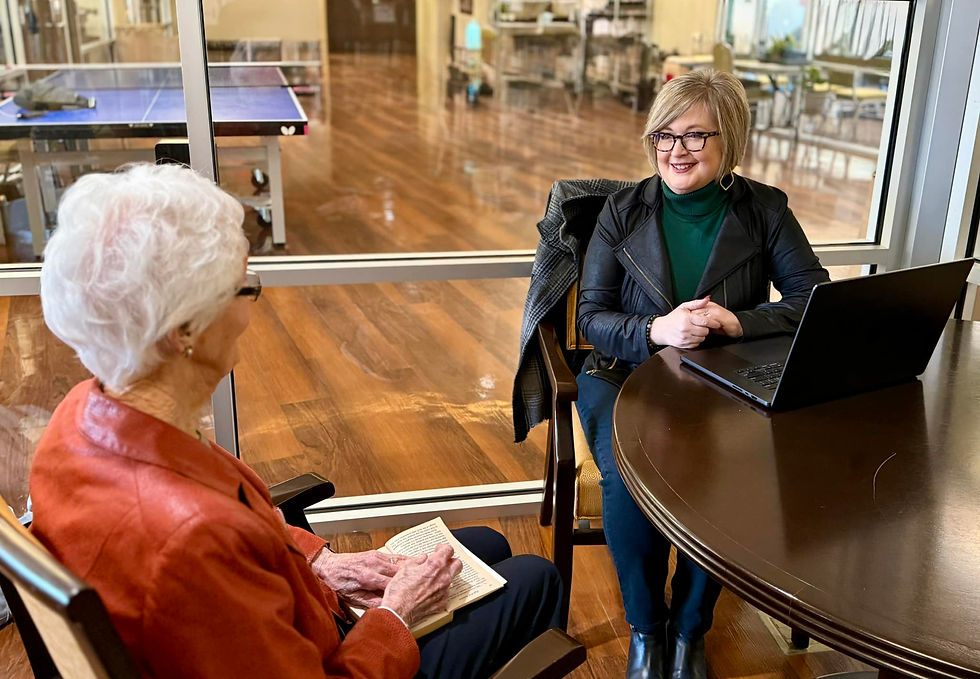The 3 hardest conversations to have with older adults (and tips to make it easier)
- Lori Williams

- Aug 22, 2025
- 3 min read
As time goes on, relationships evolve, and new conversations begin to surface, especially with senior adults in our lives. It's not uncommon to find ourselves tiptoeing around certain discussions, unsure of how to approach them without causing discomfort or misunderstanding.

Today, I want to talk about three conversations that tend to be particularly challenging: taking the car keys away, transitioning from independence, and end-of-life planning.
These aren't easy topics, and they require sensitivity, patience, and the right timing. Personally, I've found that initiating these discussions takes a little courage and a lot of empathy. But don't worry—you're not alone in this. By tackling these topics with care, we can foster understanding and strengthen our bonds with those we love.
End-of-Life Care: More Than a Difficult Conversation
It's crucial to remember that these discussions are about providing peace of mind and ensuring that their wishes are respected. Framing it as a collaborative planning effort can ease tension and open the doors for a more meaningful exchange.
Balancing Independence and Safety
Another tricky topic is the transition from independence and driving. When it became clear that it was no longer safe for my grandmother to live alone, addressing the subject was heart-wrenching. It's important to focus on sensitivity, avoiding any language that might make them feel invalidated. Finding the right senior living arrangement can feel like a tightrope walk, but framing it as a way to ensure their safety and comfort usually helps.
End-of-life Planning: Uncovering the Inevitable
End-of-life conversations can be uncomfortable at any age, but they’re increasingly vital as our loved ones age. I discovered that approaching this with openness and honesty can lay the groundwork for a more secure future. It’s less about prying and more about ensuring that no one is left in uncertainty during difficult times.
The Role of Empathy in Difficult Dialogues
One key aspect in all these conversations is empathy. By truly listening and understanding their perspective, you’re more likely to foster a supportive environment. Seniors often have wisdom and experiences that are invaluable to these discussions. Tap into that and make them feel heard.
Emphasizing Legacy and Life Stories
Discussing legacy can enrich these talks, transforming what might be seen as a chore into a celebration of life and accomplishments. Encouraging them to share stories not only adds depth to their narrative but also provides a natural segue into tougher topics with a backdrop of fond memories.
Overcoming Avoidance: Taking the First Step
I’ve found that procrastination is a common hurdle. Waiting for the 'perfect' moment usually results in missed opportunities. Setting aside a time to talk, perhaps during a family gathering or a quiet candid evening, can set the stage more naturally.
Leveraging External Support Systems
There are times when bringing in a mediator or counselor can bridge the gap, especially for financial or health care discussions. They can offer an unbiased perspective that might be easier for seniors to relate to, lessening the emotional strain.
Learning from Experience: A Support System of Your Own
Finally, don't be afraid to reach out for advice from others who've walked this path before you. Hearing from friends or support groups can offer invaluable insights. We're all learning, and sharing these experiences can make the journey smoother for everyone involved.
And there you have it, the roadmap for tackling some of the most challenging conversations with senior adults.




Comments